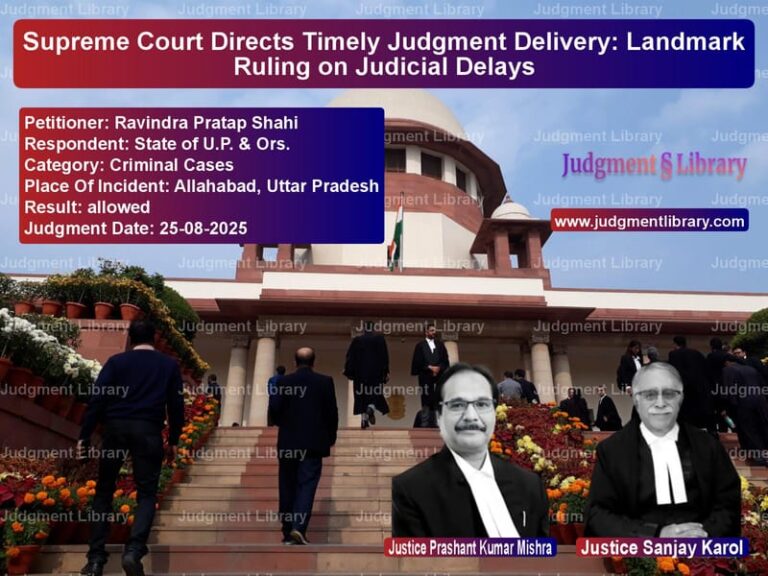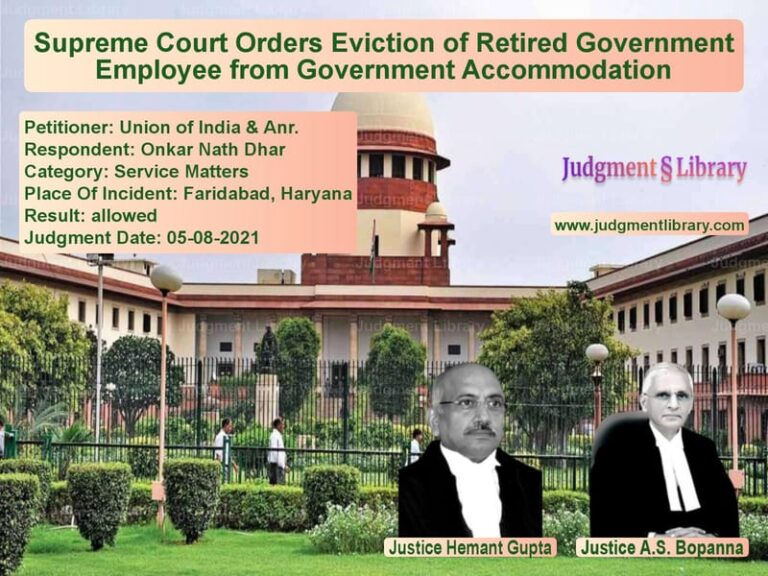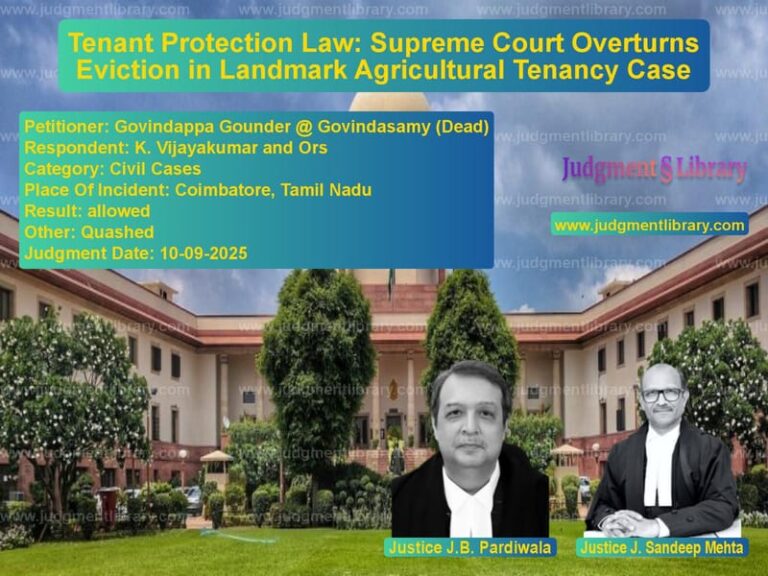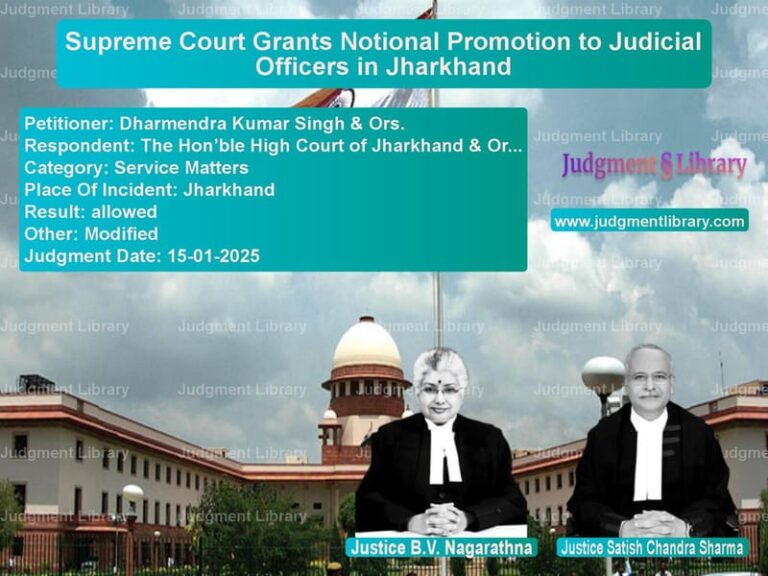Supreme Court Rules on Limitation in Industrial Compensation Dispute: North Eastern Chemicals vs. Ashok Paper Mill
The legal dispute between M/S North Eastern Chemicals Industries (P) Ltd. & Anr. and M/S Ashok Paper Mill (Assam) Ltd. & Anr. raises important questions about the applicability of the Limitation Act, 1963, to claims arising under the Jogighopa (Assam) Unit of Ashok Paper Mills Limited (Acquisition Transfer of Undertaking) Act, 1990. The Supreme Court’s decision clarifies the period within which an appeal can be filed under this special legislation and whether an appeal can be maintained after a significant delay.
This case involved a claim for compensation for the supply of goods to a sick industrial company, later taken over by the Assam government. The core issue was whether the appeal filed after more than three years was maintainable, given that the Jogighopa Act does not prescribe a limitation period. The Supreme Court ultimately ruled that the Limitation Act does not apply and that a ‘reasonable time’ principle must be followed.
Background of the Case
The dispute originated when North Eastern Chemicals Industries (P) Ltd. supplied goods to Ashok Paper Mill (Assam) Ltd. The key events leading to the case were as follows:
- Ashok Paper Mill was declared a sick company under the Sick Industrial Companies Act, 1985.
- The Assam government enacted the Jogighopa Act in 1990 to take over the unit.
- The appellant filed a claim for ₹1,58,375 along with interest under Section 16 of the Jogighopa Act.
- The Commissioner of Payments awarded only the principal sum but denied interest.
- The appellant contested this decision before the High Court, which directed reconsideration.
- The Commissioner later awarded ₹6,83,688 as interest.
- The respondents challenged the award, arguing that all pending bills had been settled.
- The appellants filed an appeal after a delay of more than three years.
Arguments of the Parties
Arguments by the Appellants
The appellants made the following key arguments:
- The Limitation Act, 1963, does not apply to appeals under the Jogighopa Act.
- The Commissioner’s decision was administrative and not a decree or order subject to limitation.
- The absence of a statutory limitation period means the appeal could be filed at any time.
- Even if a reasonable time standard applied, their delay should be condoned as they were pursuing other legal remedies.
Arguments by the Respondents
The respondents countered with the following arguments:
- The Limitation Act applies to appeals under the Jogighopa Act.
- Under Article 116 of the Limitation Act, appeals to a civil court must be filed within 90 days.
- The appeal was filed after 3 years and 6 months, which exceeds any reasonable time standard.
- Allowing such delayed appeals goes against the purpose of limitation laws, which prevent indefinite litigation.
Supreme Court’s Observations
The Supreme Court examined the case in detail and made the following key observations:
- The Jogighopa Act does not specify a limitation period for appeals under Section 22(8).
- The Commissioner of Payments was granted limited powers similar to a civil court but was not a court in the strict sense.
- The principle of ‘reasonable time’ must be applied in the absence of statutory limitation.
- The appeal was filed after the appellants pursued other legal remedies, justifying some delay.
- However, excessive delays can undermine the purpose of finality in legal proceedings.
Key Judicial Reasoning
The Court referenced several legal principles and precedents:
- The Commissioner’s powers under the Jogighopa Act were limited to certain procedural functions.
- Since the Act did not specify limitation, courts should not impose one arbitrarily.
- Precedents establish that statutory rights must be exercised within a reasonable time, even without a defined limitation.
- ‘Reasonable time’ varies based on the facts of each case, and courts should balance fairness with the need for legal finality.
Final Judgment
The Supreme Court ruled:
“The Jogighopa (Assam) Unit of Ashok Paper Mills Limited (Acquisition Transfer of Undertaking) Act, 1990, is not governed by the prescription of limitation under Article 116 of the Limitation Act, 1963. The appeal cannot be dismissed solely on the ground of delay.”
As a result, the case was remanded to the District Judge for reconsideration.
Impact of the Judgment
This ruling clarifies important principles related to industrial compensation disputes and limitation laws:
- It establishes that when a statute does not specify limitation, courts must apply a ‘reasonable time’ standard.
- It reinforces that government-acquired industrial units must adhere to fair compensation procedures.
- It balances the need for legal certainty with the right of claimants to seek justice.
The judgment serves as an important precedent for future cases involving industrial compensation and the application of limitation laws in special legislations.
Petitioner Name: M/S North Eastern Chemicals Industries (P) Ltd. & Anr..Respondent Name: M/S Ashok Paper Mill (Assam) Ltd. & Anr..Judgment By: Justice Abhay S. Oka, Justice Sanjay Karol.Place Of Incident: Assam.Judgment Date: 10-12-2023.
Don’t miss out on the full details! Download the complete judgment in PDF format below and gain valuable insights instantly!
Download Judgment: ms-north-eastern-ch-vs-ms-ashok-paper-mill-supreme-court-of-india-judgment-dated-10-12-2023.pdf
Directly Download Judgment: Directly download this Judgment
See all petitions in Contract Disputes
See all petitions in Damages and Compensation
See all petitions in Judgment by Abhay S. Oka
See all petitions in Judgment by Sanjay Karol
See all petitions in allowed
See all petitions in Remanded
See all petitions in supreme court of India judgments December 2023
See all petitions in 2023 judgments
See all posts in Civil Cases Category
See all allowed petitions in Civil Cases Category
See all Dismissed petitions in Civil Cases Category
See all partially allowed petitions in Civil Cases Category







